Do you want to study math, and are you curious about engineering, or the sciences in a compact, English-speaking EU setting? Malta might suit you better than you think. You can build a solid quantitative toolkit, then carry it into finance, data, engineering, education, and more.
Prefer pure mathematics? Lean toward accounting or a math-plus pathway? Either way, the graduate outlook is broad. Employers here value numerate problem-solvers and, across sectors, that demand is steady. Results won’t hinge on a single salary figure, though your study-units, projects, and practical experience often shape outcomes far more than any headline average.
Below you’ll find the essentials for studying math after sixth form in Malta.
💡 Malta’s qualifications are aligned with the European Qualifications Framework (EQF), which makes it easier for graduates to continue their studies or work across the EU?

Undergraduate Math Degrees at a Glance
Finish sixth form (or an equivalent upper-secondary route) and you can step into an undergraduate math degree in Malta. A standard BSc in Mathematics runs three years: Years 1–2 focus on compulsory study-units; Year 3 opens into specialist streams. At the University of Malta, those streams include Applied Mathematics, Graph Theory & Combinatorics, Functional Analysis & Topology, and Biomathematics. A tidy way to direct your depth without losing breadth.
A bachelor’s is typically enough for entry into many roles, provided your transcript shows relevant electives and a coherent project. Expect coverage along the lines of:
- Algebra
- Geometry
- Numerical analysis
- Data analysis
- Differential calculus
- Probability and statistics
- Finance
- Structured programming
- Engineering mathematics
- Coordinate and vector geometry
- Analytical and computational foundations
Year 1 is mostly core, with limited choice. As you move into Years 2–3, optional units expand and you can align with a stream or an interdisciplinary interest. Credit rules still keep the centre of gravity in mathematics, although a small number of out-of-faculty options may be permitted.
Optional units are there to widen your scope, not to dilute it, programme boards set caps so you don’t wander off-track. Some degrees include a placement or project that applies mathematics to concrete problems; others make room for short exchanges that broaden experience without derailing credit requirements.
For entry, Maltese programmes emphasise Advanced level Mathematics (or a recognised equivalent). Physics is commonly recommended. If you don’t hold a local credential, universities can assess recognised equivalents against the Malta Qualifications Framework (MQF) and the EQF via the MFHEA’s recognition processes (MQRIC).
International applicants without MATSEC should contact admissions about accepted qualifications and grade bands. Where your schooling wasn’t in English, expect to present a Secure English Language Test (SELT) that meets the undergraduate threshold; UM lists IELTS 6.0 overall for UG and also offers its own ISET route.
Plenty of students carry on to postgraduate study, immediately or after some time in industry, especially in applied data, operations research, or education. Malta’s pathways let you keep mathematics central while combining it with computing, engineering, or finance when it helps your goals.

What Do You Need to Study to Get Onto a Math Degree?
Subject expectations tend to rhyme across institutions, but grade thresholds differ. Advanced/Pure Mathematics at upper-secondary level sits at the core; Physics or IT can strengthen an application depending on your intended stream. UM publishes programme-specific Special Course Requirements each year, so check the combinations that apply to your intake.
Apply across a sensible range. Competitive courses are selective, so mix ambitious choices with solid alternatives. Beyond grades, show genuine engagement: problem-solving clubs, olympiad practice, modelling contests, or a small coding/data project. Those signals help your personal statement show you’re ready for a proof-heavy, computation-aware curriculum.
Budget time as well as money. Full-time undergraduates spend many independent hours on proofs, computation, and group work. Returning learners can look for part-time or bridging routes.
If you’re applying from abroad and need funding approval at home, start early. For admissions, non-local awards are compared to MQF/EQF levels through institutional review and, where relevant, MQRIC comparability.

Math: How to Get Onto Math-related Degrees?
Three upper-secondary results might tick the box on paper; strong offers usually require more. Meet the formal criteria, then differentiate: olympiad-style problems, a small modelling or data project, or a neat programming portfolio. Universities also look for rounded contributors to campus life, so keep interests outside maths alive.
Use your personal statement to prove you can handle abstraction and collaborate. Point to where mathematics powers Malta’s economy, logistics, aviation, iGaming analytics, fintech, health, public policy modelling, and join the dots from your interests to your proposed stream.
and description

Where to Study Math in Malta
Focus less on league-table noise and more on fit: streams, supervision style, and the support you’ll actually use.
University of Malta (UM)
UM is Malta’s public research university and the main destination for degree-level mathematics. Instruction is in English; international entrants typically satisfy the English requirement with an accepted test (or UM’s ISET). The degree concentrates compulsory study-units early, then shifts to third-year streams—Applied Mathematics, Graph Theory & Combinatorics, Functional Analysis & Topology, Biomathematics—backed by projects that build communication as well as technique.

Malta College of Arts, Science & Technology (MCAST)
MCAST offers applied, MQF-mapped routes where mathematics underpins engineering, ICT, and technical fields, useful if you prefer hands-on, industry-aligned study. Programmes clearly indicate MQF levels and credits so you can plan progression or use a diploma as a practical exit point.
American University of Malta (AUM)
AUM delivers English-taught undergraduate programmes with published minimums for language proficiency (for bachelor’s entry, IELTS 6.0 or recognised equivalents). Policies are time-bound, so verify the latest admissions sheet before you submit.
📘 The University of Malta is one of the oldest universities in the world, founded in 1592, and now offers full English-taught degree programmes at every level?
After Your Math Degree
A Maltese math degree travels well. Graduates step into finance, accounting, insurance, science and research support, education, IT, and business analysis, or continue to a master’s in applied mathematics, statistics/data, operations research, or education, in Malta or elsewhere in the EU. Because Malta’s qualifications are referenced to the EQF, mobility is simpler: employers and universities can read your level at a glance.
English Language, Visa, and Residence
Didn’t study through English? Plan for an approved test at the required band; UM publishes thresholds for undergraduates (e.g., IELTS 6.0 overall) and explains acceptable SELT options and timing.
Non-EU or longer-stay students should also factor in e-Residence steps. For courses exceeding 90 days, Malta allows part-time work up to 20 hours per week after your first three months of study, subject to Jobsplus licensing and sector conditions—useful, but not a replacement for realistic budgeting.
If You Need Help Preparing
Need to shore up calculus, linear algebra, proofs, or programming? Consider a short foundation or targeted tutoring block. Support can also focus on study skills, academic writing, or shaping a personal statement that fits the Maltese context.

Financial Planning and Fit
Think beyond admission: tuition, accommodation, transport, books or software, and any residence-permit or health-insurance costs. Many international students arrange funding in their home country. Shortlist programmes by stream options, project or placement availability, and assessment style. If you’re aiming at data, weight statistics and computing; for education, look for pedagogy or school-experience components. Campus visits and open days help you calibrate expectations before you commit.
Which branch of mathematics interests you most?














